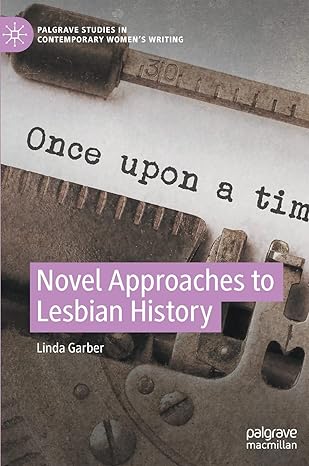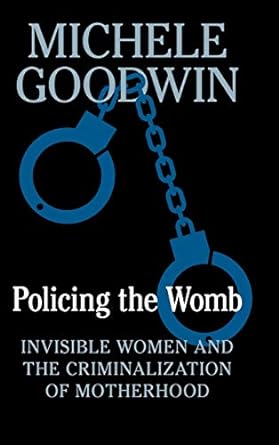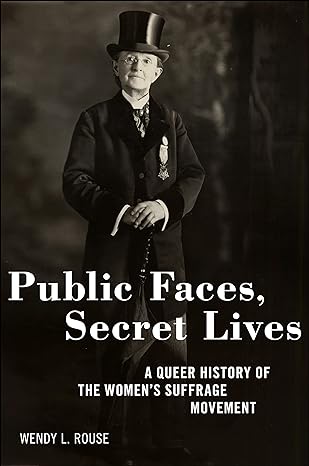The Libraries celebrate Women’s History Month by highlighting research works in our collections by and about women. Women’s history means the representation of historically excluded groups, such as people of color, the LGBTQ community and people with different abilities. It involves accomplishments in fields including but not limited to higher education, history, literature, social justice and the STEM fields. We encourage you to read these materials available through the Libraries this month and throughout the year!

Novel approaches to lesbian history
by Linda Garber
Novel Approaches to Lesbian History tells a tale about history and community in our allegedly post-identity era, examining contemporary novels that depict lesbian characters in recognizable historical situations. These imaginative stories provide a politically vital, speculative past in the face of a sketchy, problematic archive. Among the memorable characters in some 200 novels are pirates, cowgirls, and famous artists, ghosts and time travellers, immigrants and lovers. The best lesbian historical novels are conscientious and buoyant as they engage critical historiographical questions, but Novel Approaches also discusses the class and race biases that weigh on the genre. Some lesbian historical novels are based on archival evidence, others on conjecture or fantasy, but all convey the true fact that identity is elusive without a past, without which its future is nearly impossible.

Policing the womb: Invisible women and the criminal costs of motherhood
by Michele Godwin
In Policing the Womb, Michele Goodwin explores how states abuse laws and infringe on rights to police women and their pregnancies. This book looks at the impact of these often arbitrary laws which can result in the punishment, incarceration, and humiliation of women, particularly poor women and women of color. Frequently based on unscientific claims of endangering a fetus, these laws allow extraordinary powers to state authorities over reproductive freedom and pregnancies. In this book, Michele Goodwin discusses real examples of women whose pregnancies have been controlled by the law and what has led to the United States being the deadliest country in the developed world for a woman to be pregnant.

The development of women and young professionals in STEM careers: Tips and tricks
by Michele Kruger and Hannelie Nel
This book is fluent and systematic. The authors work through the fears and ambitions of young people new to STEM careers in the professional environment. Often, there is a lack of mentors, which leaves a young STEM practitioner exposed and doubting their own abilities.
This book encourages young professionals and women in STEM careers to know that they are not alone and provides insight into their ability to deal with the stress of developing into a successful professional.
Features
- Presents a method or vehicle to fast track young professionals and women in STEM
- Includes key issues that they should be aware of as they grow and develop in their education and field
- Describes how STEM career women are owners of their own path and provides an understanding of engineering and the business of consulting
- Conveys how young professionals and women in STEM can be aware of their own productivity and enjoy what they do and the career path they have selected
This book is ideal for those new to the engineering, science, and consulting fields, including students in science and engineering education, administrators, libraries, those involved in leadership, organization behavior, human resources, STEM, and other areas as well.

The power and freedom of Black feminist and womanist pedagogy: Still woke
edited by Gary L. Lemons and Cheryl R. Rodriguez
The Power and Freedom of Black Feminist and Womanist Pedagogy: Still Woke celebrates and reaffirms the power of Black feminist and womanist pedagogies and practices in university classrooms. Employing autocritography (through personal reflection, research, and critical analysis), the contributors to the volume boldly tell groundbreaking stories of their teaching experiences and their evolving relationships to Black feminist and womanist theory and criticism. From their own unique perspectives, each contributor views teaching as a life-changing collaborative and interactive endeavor with students. Moreover, each of them envisions their pedagogical practice as a strategic vehicle to transport the legacy of struggles for liberating, social justice and transformative change in the U.S. and globally. Firmly grounded in Black feminist and womanist theory and practice, this book honors the herstorical labor of Black women and women of color intellectual activists who have unapologetically held up the banner of freedom in academia.

Public faces, secret lives: A queer history of the women’s suffrage movement
by Wendy L. Rouse
Over one hundred years ago, women organized to fight for a federal suffrage amendment. But many suffragists were fighting for much more than the vote. The suffrage movement included individuals who represented a wide range of genders and sexualities. It also included a variety of queer relationships. But, suffrage leaders concerned with presenting a respectable public image concealed the queerness of the suffrage movement. This resulted in greater policing of suffragist behavior as suffrage leaders, many of them queer themselves, publicly conformed to gendered views of acceptable appearance and behavior. The problematic effect was to erase the queer history of the movement. Instead suffrage leaders reinforced a patriarchal, heteronormative, cisgender standard of ideal femininity in order to make suffragists and women’s suffrage more palatable to the public. The legacy of queer suffragists, however, could not be so easily erased. This book explores how queer women led the suffrage movement while challenging heteronormative concepts of domesticity, family, space, and death in both subtly subversive and radically transformative ways. This book also highlights the alliances that queer suffragists built and the innovative strategies they developed to protect and preserve their most intimate relationships – relationships that were ultimately crucial to the success of the suffrage movement.

Counternarratives from women of color academics: Bravery, vulnerability, and resistance
edited by Manya Whitaker and Eric Joy Denise
This book documents the lived experiences of women of color academics who have leveraged their professional positions to challenge the status quo in academia through their scholarship, teaching, service, activism, and leadership. By presenting reflexive work from various vantage points within and outside of the academy, contributors document the cultivation of mentoring relationships, the use of administrative roles to challenge institutional leadership, and more. Through an emphasis on the various ways in which women of color have succeeded in the academy—albeit with setbacks along the way—this volume aims to change the discourse surrounding women of color academics: from a focus on trauma and mere survival to a focus on courage and thriving. This book documents the lived experiences of women of color academics who have leveraged their professional positions to challenge the status quo in their scholarship, teaching, service, activism, and leadership. By presenting reflexive work from various vantage points within and outside of the academy, contributors document the cultivation of mentoring relationships, the use of administrative roles to challenge institutional leadership, and more. Through an emphasis on the various ways in which women of color have succeeded in the academy—albeit with setbacks along the way—this volume aims to change the discourse surrounding women of color academics: from a focus on trauma and mere survival to a focus on courage and thriving.
Summaries of books are quoted from publisher information.






